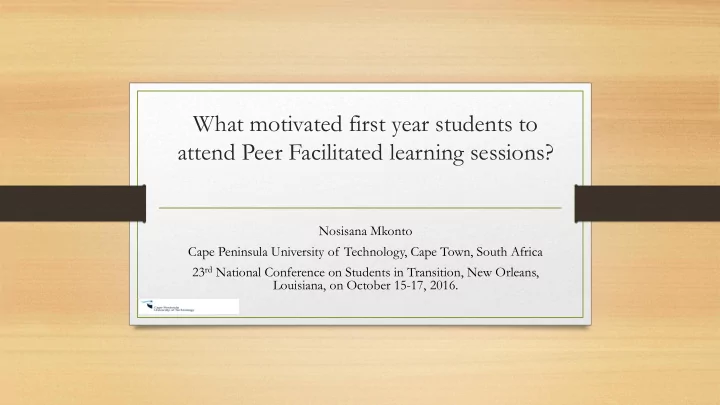

What motivated first year students to attend Peer Facilitated learning sessions? Nosisana Mkonto Cape Peninsula University of Technology, Cape Town, South Africa 23 rd National Conference on Students in Transition, New Orleans, Louisiana, on October 15-17, 2016.
Background • Post 1994 – enrolment increase – heterogeneous cohort – diverse learning needs and demands • Challenge with transition from high school to university • Lack of interface between high school and university • No support – drop out and failure • Peer facilitated learning (PFL) programme – academic support – increase students’ success in at -risk subjects
Peer-facilitated learning (PFL) • A resource to improve learning and teaching – complementary • Enhance learning and personal development (Lorenzo & Juste, 2008) • Inspire students to devote time and energy to educationally purposeful activities – inside and outside the classroom (Kuh, 1996) • Enhance university experience by linking academic learning with lives outside classroom
Theoretical Framework This study is framed by the sociocultural theory (Vygotsky) and learning communities model (Tinto) in order to understand challenges of socialisation and transition faced by first year students.
Zone of Proximal Development (ZPD) (Vygotsky 1978) • Tutor mediates student knowledge constructs within the students’ ZPD • Tutor the More Knowledgeable Other (MKO) • Tutor provides knowledge and support – solve problem students cannot solve on their own
Learning communities (LC) • PFL engaged in learning communities (LC) • Students in LC are responsible for group and own learning This is what happens in LC (Tinto, 2003)? • Shared knowledge • Shared knowing • Shared responsibility
CPUT Peer facilitated learning (PFL)programme • Based on the concept of Supplemental Instruction (SI) • Tutor trained – from 2 nd year level – academic support 1 st year students • Tutors – excellent academic results, communication and interpersonal skills • Work with lecturer • Tutors revision, explaining difficult concepts, clarifying difficult text and problem solving • Participants determine the pace of teaching and learning • Open for all students: at risk (mandatory) and those wanting to achieve higher grades
Methodology • Qualitative study – investigate benefit and motivation for students attending PFL • Studied reality in its natural context – gain deeper understanding of the researched situation • Data collected through semi-structures interviews, observations and focus group discussions
Participants Participants included 20 students and 4 tutors: • 8 students identified by lecturer as being “at risk” – failing Accounting (obtaining marks below 50%)- PFL mandatory • 12 students wanted to improve their marks • A mix of local (14 students) and international students (6 students) • Tutors had 5 students in the PFL session
Context • Department of Marketing – students struggling with Accounting • Accounting calls for grasp of financial concepts, understanding business discourse and problem-solving skills • Open for all 1 st year students but mandatory for scores below 50% • Sample of 20 students and 4 tutors
What motivates students to attend PFL sessions? Academic aspects • Scaffolding information into smaller manageable bites • Connect new material with prior knowledge • Concepts clarification, further explanation, problem solving • Immediate response and feedback • Less threatening environment • Formed learning communities • Use of technology to provide students with “access further people support” (van der Meer & Scott 2008, 71)
Social aspects PFL provided emotional support : • Having fun and forming new friendships – tackle academic aspirations, • Comfortable to disclose ignorance, stupidity, misconceptions • Seek advice without being judged on emotional issues, poor adjustment and poor academic, social and personal functioning • Tutors gave overall support to students in need
Affirming cultural diversity PFL provided for intercultural interaction • Intake of international students – experience psychosocial problems - adjustment • Culture shock – life in different country – loneliness, dietary changes, emotional distress • PFL treated equally – share stories – social integration • PFL encourage intercultural interaction
Language and communication PFL provided space for communication • English (LOL) – inadequate proficiency in English – both local and international – 11 official languages (SA) • Code-switching – same mother tongue • Tutor mediates where language is used as a mechanism of power • Students offered opportunities to practice communication skills; listening, explaining and summarising
Discussion • Effective transition depends on the relationship between academic and social aspect – both local and international students benefit • PFL help students help students to gain epistemological access and success – marks improved • PFL provided holistic support (personal, emotional, social and cultural) • PFL encouraged cultural cohesion and integration • Students made use of technology to enhance learning outside the PFL
THANK YOU ANY QUESTIONS?
Recommend
More recommend